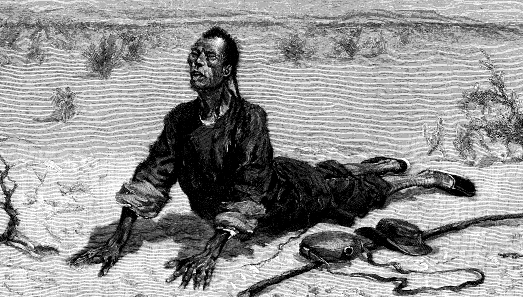I have heard a new idiom thrown about when talking about good Lutherans who abandon the purity of the Gospel and enslave themselves to the error and sophistry of Roman Catholicism so that they can be a part of a Rome that no longer exists. (Heehee... how's that for inflammatory language?) People say that John Q. Public swam the Tiber. Since the Tiber is a river in Rome, I guess that the metaphor fits. In fact, you can see the Vatican from the bank of the Tiber River.

With this idiom in mind, I would like to point out that Rome has had a long history of drowning their own citizens in the Tiber or at least disposing of their corpses by throwing them into the river. The king Tiberinus Silvius was drowned in the river. That is how the river got its name. It is a river for killing people and getting rid of dead weight.
I would also point out that the Tiber is prone to rampant flooding because it refuses to stay within the limits of its banks. The river is also very difficult to navigate safely by boat. Another problem with the Tiber river is that the bottom is filled with sediment from constant silting and the level of muck at the bottom of the Tiber rises with each passing year.
William Shakespeare wrote a really good passage that assocoated the Tiber River with the heart of Rome. I find it to be very apt for this metaphor. In speaking to commoners who were blindly celebrating Caesar's dictatorial rise to absolute power by defeating Pompey, Marullus and Flavious admonish them for their ingratitude for Pompey's sacrifices and victories. How wonderfully this applies to those who return to their Caesar, the Pope, and betray the holy work of the Reformation!
MARULLUS:
Wherefore rejoice? What conquest brings he home?
What tributaries follow him to Rome,
To grace in captive bonds his chariot-wheels?
You blocks, you stones, you worse than senseless things!
O you hard hearts, you cruel men of Rome,
Knew you not Pompey? Many a time and oft
Have you climb'd up to walls and battlements,
To towers and windows, yea, to chimney-tops,
Your infants in your arms, and there have sat
The livelong day, with patient expectation,
To see great Pompey pass the streets of Rome:
And when you saw his chariot but appear,
Have you not made an universal shout,
That Tiber trembled underneath her banks,
To hear the replication of your sounds
Made in her concave shores?
And do you now put on your best attire?
And do you now cull out a holiday?
And do you now strew flowers in his way
That comes in triumph over Pompey's blood? Be gone!
Run to your houses, fall upon your knees,
Pray to the gods to intermit the plague
That needs must light on this ingratitude.
FLAVIUS:
Go, go, good countrymen, and for this fault
Assemble all the poor men of your sort;
Draw them to the Tiber banks, and weep your tears
Into the channel, till the lowest stream
Do kiss the most exalted shores of all.
-Shakespeare's Julius Caesar, Act I Scene I
Which brings us to another important Roman river: The Rubicon. The interesting thing about this Roman river is that scientists and historians have discovered that the Rubicon abandoned its original riverbed long ago by meandering off course. The Rubicon has a famous idiom as well. In fact, it is probably better known than the one about the Tiber. When someone passes the point of no return we say that they have crossed the Rubicon. To protect the republic from a coup, Roman Law forbade any general from crossing this river with his army. Julius Caesar violated that law in his attempt to seize control of Rome from his governmental peers, the Senate. When his fellow statesmen would not bow to his will, Caesar crossed the Rubicon with his army and imposed an authority that was not his to assume.
The Senate backed a general named Pompey to defend Rome. When Caesar marched on the city, Pompey and the army abandoned the capital and waged a protracted war with Caesar in various places throughout the Empire. Caesar not only fought Pompey, he hunted down and violently engaged anyone who opposed his absolute rule. Pompey was eventually defeated and the Senate that had previously supported him turned to Caesar and voted to elect him dictator for life. At that moment, the ideal of the Roman Republic that had liberated the people from the absolute rule of the ancient Etruscan kings was cast aside. Rome lived on for many centuries after that and they continued to flourish, but Senatus Populusque Romanus had become an empty motto; the Roman Republic was no more. Rome was no longer Rome. Like the Tiber and the Rubicon, she had left her riverbed and flowed in a different direction.

Like Senatus Populusque Romanus, The church of Rome has a motto that no longer means what it once did: catholic. Rome stopped being "universal", "useful to all", and "all-embracing" when her Caesar tied Rome's authority to the rulings of the government and not the ideals of her people. Like the dictatorial empire that she grew up with, she still called herself Rome, but she was not what she once was. In both cases (the civilization and the church) her rulers had severed the legacy upon which she was built. The great Cincinnatus would not recognize this new way of doing things in Rome. She was no longer a state which adhered to common principles. After the rise of Caesar, she was now a state which interpreted and invented principles in an unending progression of trends, reforms, and initiatives.
So when you decide to swim the Tiber, be sure to remember that your new Caesar, whose office was created when his predecessor first crossed the Rubicon and betrayed all of Rome, was never intended to be the absolute authority of the Empire. There was a time when the consuls, co-consuls, senators, citizens, and slaves all lived under the rule of law which was above all men. Final authority was reserved for Rome herself. That was Rome before individual Romans started attempting to invent the rule of law from the authority of their chairs and by the seat of their pants. Rome, like her rivers, has become full of dirt.

I'd like to contrast those two Roman rivers with another river. The Danube River is the longest running river in what is now the European Union. It spans east and west by stretching from western Germany to the Black Sea. It is much longer than the muddy Tiber or the tiny Rubicon. For centuries the Danube stood as the border for the Roman Empire. It was the river that marked the limits of Caesar's domination over the earth. Even today the Danube is a vital source of drinking water that gives life to millions of people. Geologist agree that the Danube River is very ancient. In fact it is even older than the Rhine.
It is true that the Danube has become far more shallow than it used to be, but it has maintained its course through the ages. Why? The foundation of the bed of the Danube is solid limestone; not shifty sand like the Tiber and the Rubicon. Give me a shallowing but solid Danube over those muddy, wandering rivers that are filled with Roman bones any day of the week.


 Mary stays put, but Jesus is turned around so that the two figures are looking at each other and making eye contact. Doesn't this make sense that Mary and her child would be so intimate on that first Christmas Eve? Showing the connection between the Theotokos and her Child had never occurred to me. I do not know if she did this on purpose, but Joseph does not stand next to Mary. He is on the opposite side as if to be apart from the union between mother and Child.
Mary stays put, but Jesus is turned around so that the two figures are looking at each other and making eye contact. Doesn't this make sense that Mary and her child would be so intimate on that first Christmas Eve? Showing the connection between the Theotokos and her Child had never occurred to me. I do not know if she did this on purpose, but Joseph does not stand next to Mary. He is on the opposite side as if to be apart from the union between mother and Child. December 7, 1941 - A date which will live in infamy
December 7, 1941 - A date which will live in infamy
